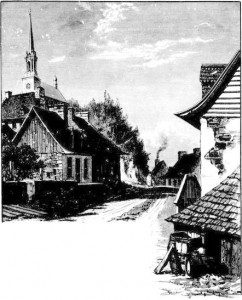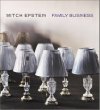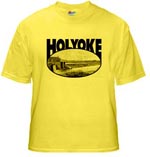by Laurel | December 10th, 2013
11 December 1904
[Note: this piece was published in 1904 and should be considered representative of the time. Initially a bit verbose, as the article continues there is some interesting information on the French Canadians in Holyoke and Springfield. Because of the length, the article has been split into six parts, this is Part I of VI.]
Race, Integrity and Language Preserved to a Remarkable Degree–Causes of the Immigration Movement — Customs and Literature.
There are today in New England upward of 525,000 French Canadians. Of these over 250,000 live in Massachusetts. in Fall River alone there were 38,000 before the strike, and there are 31,000 now. The large proportion of our total population in whose veins thus flows still almost unmixed and pure the blood of pleasant France, for race integrity is one of the strongest characteristics of the French Canadian, must surprise one who has not had special wisdom to inform himself. That fact is important. To explain why the numerical strength of this stock is not more generally realized would be of itself to draw much of the picture of the French Canadian, which it is the object of this article to reproduce. But outlined most briefly as an introduction the principal causes may be set down as: The high intelligence and therefore the ready adaptability to new conditions of the average French-Canadian, the failure until perhaps recently to make use of the possible political power which numbers and race cohesion have placed in his hands, and many characteristics both of body and mind that are markedly different from those of the real Frenchman of toady, particularly the Parisian, who is naturally set down as the French type.And yet, though it is patriotically American, to stock of the many from which the body of our citizenship is made guards so tenaciously as the French-Canadian its separate race identity, and especially, as the chief means to that end, its language. This is due in the largest measure to the fact that the French-Canadians have not come direct from a land in which they were the dominant race, but from one in which for 100 years they had represented a race whose sovereignty had been wrestled from it. They were, so to speak, the captured outpost of a careless king, who, underlying with Madame de Pompadour, had, like Voltaire, thought of Canada, according to that contemptuous phrase as “only a few acres of snow.” Thus at least the French historian reads the struggle for supremacy in the new world, and blames his forbears for not throwing their fuller resources into the scale, while to others it seems rather a struggle between two systems with one inevitable result. But the fact remains that no other French colony has so endured and remained French as that of Canada, and this in spite of English rule.
The instinct of self preservation as a race, fostered this throughout a century, is stronger today with the French Canadians than with any other people amongst us. Moreover the necessary machinery may be said to have been fully developed along with the instinct. Their English rulers in Canada being Protestant, while the French Canadians were Catholic to a man, the religion and nationality of the latter became so mutually dependent as to be almost identical. When, Therefore, the French Canadian, intensely religious in character, migrated unto New England, the fostering church followed him, and not only were churches built were he could worship after his own faith and in his own tongue, but also parochial schools were founded by the church, where his children are taught to speak French as well as, or better than, he himself. The parochial school, in fact, is the keystone in the preservation of the separate identity of the French Canadian.
The carpenter, to name a trade for which the French-Canadian has shown peculiar aptitude, swinging his tool kit in his hand or on his shoulder, black-haired and clean-limbed though he be, offers the imagination no suggestion of his possible progenitor, the “coureur de bois,” that famous wanderer of the northern wood, who, with the no flinching Jesuit, gave grim romance to the story of Canada. Yet our French-Canadian had more in common with that fur clad being of the trackless forest that with the French artisan of the Paris faubourgs of today. It is not chance that has made him different from the Parisian, but sturdy ancestry and the evolutionary process of selection. The French as a race have failed in their efforts at colonization. The familiar song runs:
Voici mon envie!
Voici mon seul desir!
Dounez moi ma patrie,
On laissez moi mourir.
Which very freely translated for the rhyme may read:
Behold my fondest wish!
O hear my heart’s one cry!
Oh give to me my fatherland,
Or, if not, let me die.
The words suggest why France has failed as a colonizer. But the settlers of the province of Québec were the best and sturdiest of the race. No city bred folk they. Stout hearts and hands from Normandy and Bretagne were theirs. Brave sailors from St. Marie, sturdy farmers from Anjou and L’Ile de France were many of them, and there in Lower Canada, along the St. Lawrence, by the law of the survival of the fittest, the best of this good sock survived, cultivating their farms running back from the river, their quaint houses clustering close around the sharp-spired churches, and there they kept France warm in their hearts. They have fought for a faith and for an idea, hence that have remained French.
Continued in Part II
From The Springfield Republican










Thanks for posting this. You might be interested in my book (The Bourgeois Frontier: French Towns, French Traders, and American Expansion) and a book by Andrew Erdman on Eva Tanguay–early vaudeville star, a role model for Mae West, and a native of Holyoke, MA. (she was born in Quebec.)
Jay,
Thanks for your comment. I am unfamiliar with your book, but will certainly add it to my list, thanks for mentioning it. I have a lot of French Canadian ancestry connected to my family and I find the era fascinating.
Oddly, Andrew contacted me some many years ago when he was just embarking upon researching Eva Tanguay. (I actually have had this website since the mid-1990’s, which is eons in Internet time.) I do not recall having much to offer Andrew at the time. However, this many years later I actually have the Tanguay line connected to my greater Holyoke database via Eva’s sister and there is some interesting/sketchy material there as well. Still working on it, of course.
I took the liberty of looking at your profile and your research is really interesting … had I been fully aware of the path history could take when I was an undergrad, my choices might have been very different!
Laurel